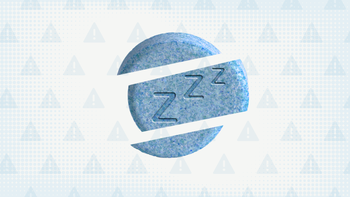
9 Medications That Can Cause Insomnia — and What You Can Do to Sleep Better
Key takeaways:
Insomnia is a common side effect of many medications, such as those that treat ADHD, high cholesterol, and a stuffy nose.
It’s important to speak with your healthcare provider if you’re experiencing insomnia from a medication. They can help you find alternative treatment options or better times to take your medication.
Melatonin is available over the counter as a sleep aid, but it’s not always the most helpful option. Make sure to speak with your healthcare provider or pharmacist about melatonin before trying it on your own.
Table of contents
Sleepless nights can be incredibly frustrating. They have a habit of turning into a tiresome cycle that can be hard to break: It begins with hours of tossing and turning, which might send your mind racing to identify all of the things that might be keeping you awake. And in turn, it can make it even harder to fall asleep.
But what if one of the medications you’re taking to stay healthy is also causing your sleep troubles? Could your recent dose of Sudafed be keeping you awake? Here, we’ll discuss nine common medications that have been reported to cause insomnia symptoms and could be keeping you from a restful night.
1. Decongestants like Sudafed
Decongestants are common treatment options when you’re suffering from a stuffy nose due to a cold or seasonal allergies.
Search and compare options
When needed, oral decongestants — like pseudoephedrine (Sudafed) or phenylephrine (Sudafed PE) — are go-to options for relief. Nasal decongestant sprays, like oxymetazoline (Afrin), are also widely available. One of the most common side effects of decongestants is insomnia (difficulty sleeping). This is mainly the case for oral decongestants.
Depending on the severity of your insomnia, and for how long you’ve been congested, your healthcare provider may recommend something other than a decongestant for your symptoms. If they decide to try another medication, they could prescribe a steroid nasal spray like mometasone (Nasonex), an antihistamine nasal spray like azelastine (Astepro), or nasal saline.
2. SSRIs like Prozac
SSRIs (selective serotonin reuptake inhibitors) are antidepressants that raise serotonin levels in your brain. Serotonin is a hormone that’s well-known for its role in regulating mood, but it’s also important for many other aspects of your health.
What’s more, SSRIs — such as fluoxetine (Prozac) and citalopram (Celexa) — are some of the most commonly prescribed antidepressants for conditions like depression and anxiety. Even though they’re quite effective, one of their more common side effects is difficulty falling asleep or staying asleep.
If you’re taking an SSRI and having trouble sleeping, make sure to talk with your healthcare provider about the best time to take your SSRI. And since not all antidepressants are created equal, you could also ask them about other SSRIs that are less likely to cause sleeping issues.
3. Stimulants like Adderall
Stimulant medications, such as methylphenidate (Ritalin) or Adderall (mixed amphetamine salts), are used to treat attention-deficit hyperactivity disorder (ADHD). But due to how they work, they may also cause insomnia. This is because stimulants act on your central nervous system, leading to increased focus and alertness.
If you or a loved one are taking stimulant medications, your healthcare provider can work with you to find the best dose that manages your ADHD symptoms while minimizing side effects. They can also help you identify the best time of day to take your doses. In some cases, they may recommend a non-stimulant treatment option instead.
4. Corticosteroids like dexamethasone
When you’re feeling stressed, you might find it hard to get to sleep. Stress causes your body to release a hormone called cortisol, which can make you feel restless at night.
Certain medications can also mimic cortisol in your body. This can lead to restlessness and trouble sleeping. Corticosteroid medications, like dexamethasone and methylprednisolone, (Medrol) are key examples.
In most cases, insomnia from corticosteroids should be short-lived. That’s because these medications are typically only used for short amounts of time. Taking your corticosteroid doses in the morning should also help. But if your insomnia symptoms don’t go away, or you need to take corticosteroids long-term, make sure to ask your healthcare provider for advice.
5. Beta blockers like propranolol
Beta blockers are a large group of medications that are often used for high blood pressure and other heart conditions. Top examples are metoprolol succinate (Toprol XL), carvedilol (Coreg), and propranolol. However, they can cause side effects — including sleep disturbances like insomnia and nightmares.
If you’re taking a beta blocker and are experiencing side effects like these, make sure to talk to your healthcare provider. They can offer tips and tricks for managing these symptoms, such as avoiding exercise and stimulating activities before bed. They can also talk to you about alternative treatment options.
6. Cholinesterase inhibitors like Aricept
Alzheimer’s disease is the most common form of dementia. Cholinesterase inhibitors, such as donepezil (Aricept, Adlarity), are one group of Alzheimer’s medications that can help treat certain symptoms of the condition, such as confusion and memory loss. They work by increasing your body’s acetylcholine levels, which helps improve symptoms related to memory and learning.
Alongside their effects on learning and memory, cholinesterase inhibitors can also cause trouble sleeping. It’s one of their more common side effects. If you have a loved one with Alzheimer’s disease that’s experiencing insomnia, make sure to reach out to their healthcare provider.
7. Theophylline
Theophylline (Elixophyllin, Theo-24) is a maintenance medication used to treat asthma and COPD.
While it helps put your lungs at ease, theophylline can have different effects throughout your body. Some people report that theophylline’s most common side effects resemble that of having too much caffeine. Similar to drinking a cup of coffee too close to bedtime, this can lead to trouble sleeping.
Thankfully, this side effect is usually temporary. But if it doesn’t go away, this could be a sign your theophylline dose is too high. If you’re taking theophylline, your healthcare provider will check your blood levels regularly to prevent theophylline toxicity.
8. Thyroid hormone replacement
Hypothyroidism is a health condition caused by an underactive thyroid gland. A first choice medication for treating hypothyroidism is levothyroxine (Synthroid), which works by replacing thyroid hormone.
When you’re first starting levothyroxine, it’s common to experience insomnia. This can also happen when you’re changing doses. When your levothyroxine dose is too high, it’s common to develop symptoms that resemble hyperthyroidism, such as insomnia, anxiety, and excessive sweating. Your healthcare provider should routinely check your blood work and make dose adjustments as needed.
9. Nicotine replacement medications like Nicoderm CQ
Nicotine replacement therapy (NRT) is one of the most effective ways to quit smoking. There are many over-the-counter (OTC) NRT products available for you to choose from. Nicotine skin patches (Nicoderm CQ) are one option. Nicotine gum or lozenges are other go-to options.
Of these, trouble sleeping and vivid dreams are common side effects of the nicotine patch. This is especially true if you leave it on your skin overnight. If you’re experiencing sleeping troubles with nicotine patches, ask your healthcare provider about another NRT option.
Should you take medications like Sudafed before bed?
No. If possible, try to avoid taking medications like Sudafed before bed. They can make it harder to fall asleep. By taking them earlier in the day — or at least a few hours before bed — they’re less likely to cause insomnia.
Your pharmacist and healthcare provider can tell you more about the best times to take your medications.
What should you do if your medications are causing insomnia?
Sleep is important to your health, so insomnia that doesn’t go away isn’t something to overlook. If you think your medications are causing insomnia, you should talk to your healthcare provider about it. They may:
Recommend an alternative medication
Reduce your medication dose
Recommend a different time of the day to take the medication
In some cases, they may also recommend a supplement to help promote sleep. Melatonin is one supplement that’s widely available OTC to help promote sleep. However, melatonin won’t always help for insomnia caused by medications. To see if melatonin may be an effective option for your situation, make sure to ask your pharmacist.
More tips for better sleep
There are several strategies you can take on your own to deal with medications that cause insomnia and to promote better sleep. Here are a few tips to improve your sleep at night:
Turn off bright screens and any sources of blue light (like TVs, laptops, or smartphones) an hour before bed
Keep your room dim or dark with blackout curtains
Engage in a calming activity like a bath, shower, or meditation beforehand
Only use your bed for sleep and intimate activities
Avoid physical activity several hours before bedtime by exercising in the morning or during the day
Avoid or minimize napping during the day
Avoid caffeine up to 6 hours before bed
The bottom line
There are many medications that can cause trouble sleeping. Some top examples include decongestants, stimulant ADHD medications, and corticosteroids. Other common medications, like SSRIs and beta blockers, can also lead to a late night.
If you think a medication is causing insomnia, make sure to speak with your healthcare provider. They can help you manage your symptoms and offer alternative options, as necessary.
Why trust our experts?



References
Centers for Disease Control and Prevention. (2022). Tips for better sleep.
Cochrane Tobacco Addiction Group. (2018). Nicotine replacement therapy versus control for smoking cessation. Cochrane Database of Systematic Reviews.
Journey, J. D., et al. (2022). Theophylline toxicity. StatPearls.
Neuroscience 2nd Edition. (2001). Acetylcholine.


























